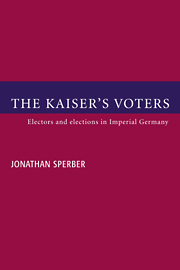Technical appendix
Published online by Cambridge University Press: 22 October 2009
Summary
In this appendix, I first discuss the nature of the sources used to develop the estimates of voting given in the body of this book. Then I outline the different mathematical methods that can be used in ecological regression and explain the specific choices I made in order to derive the estimates. Finally, I present tables giving the basic results of the different regression equations and fitting procedures, so that readers can check my interpretations of them and develop their own.
Sources
The election returns
Constituency-level election returns for each general election in Imperial Germany were published in one of the official state statistical publications, either the Statistik des Deutschen Reiches or the Vierteljahrsschrift zur Statistik des Deutschen Reiches. I consulted these materials directly, and developed my electronic database by entering them into the computer. Of course, the validity of calculations on the returns and inferences about the voters drawn from them depends on the honesty and reliability of the election returns.
The count in the Reichstag elections appears generally to have been an honest one, formal and informal institutional arrangements allowing for a good deal of oversight. If German elections were probably less marked by fraud than, say, ones in America at the same time, intimidation was another matter. In many constituencies and at many elections, secrecy of the ballot was more nominal than real; government officials, clergy, employers, and other influential parties found ways to know who voted for whom and the voters knew that they knew it. Protests about intimidation of voters constantly came before the Reichstag committees charged with validating members' credentials and these committees frequently annulled results because of the intimidation of voters.
- Type
- Chapter
- Information
- The Kaiser's VotersElectors and Elections in Imperial Germany, pp. 331 - 367Publisher: Cambridge University PressPrint publication year: 1997



